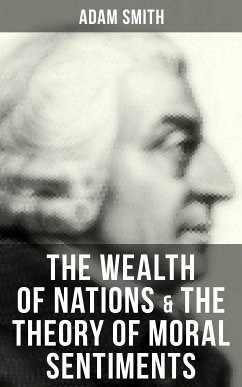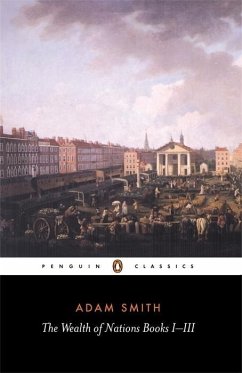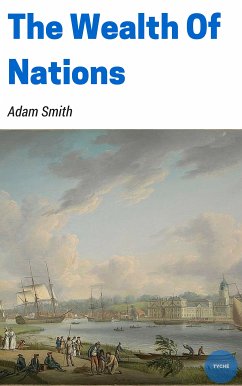
The Wealth of Nations (eBook, ePUB)
An Inquiry into the Nature and Causes (Economic Theory Classic)

PAYBACK Punkte
0 °P sammeln!
In "The Wealth of Nations," Adam Smith presents a groundbreaking examination of economic theory that laid the foundation for modern capitalism. Written in 1776, this seminal work combines philosophical discourse with empirical observation, employing a clear and accessible prose style that invites both scholarly analysis and casual inquiry. Smith meticulously explores the division of labor, the function of markets, and the invisible hand-ideas that have become cornerstones of economic thought. The book's rich historical context during the Scottish Enlightenment reflects Smith's engagement with ...
In "The Wealth of Nations," Adam Smith presents a groundbreaking examination of economic theory that laid the foundation for modern capitalism. Written in 1776, this seminal work combines philosophical discourse with empirical observation, employing a clear and accessible prose style that invites both scholarly analysis and casual inquiry. Smith meticulously explores the division of labor, the function of markets, and the invisible hand-ideas that have become cornerstones of economic thought. The book's rich historical context during the Scottish Enlightenment reflects Smith's engagement with the burgeoning ideas of individualism and free enterprise, making it a critical text for understanding the evolution of economic systems. Adam Smith, often heralded as the father of economics, was profoundly influenced by the intellectual milieu of his time, characterized by a pursuit of knowledge that transcended traditional disciplines. His experiences as a moral philosopher and social commentator are evident throughout the text, as he blends philosophical reflections with practical economic analysis. Smith's broad educational background, including classical studies and moral philosophy, provided him with the tools to critique mercantilism and advocate for the principles of free trade and individual liberty. I wholeheartedly recommend "The Wealth of Nations" to readers interested in economics, history, and philosophy. Its insights into market dynamics and human behavior remain as relevant today as they were over two centuries ago, offering timeless wisdom for both scholars and laypersons alike. Whether you seek to understand the roots of contemporary economic policies or engage in philosophical inquiry, Smith's magnum opus is an indispensable addition to your intellectual journey.
Dieser Download kann aus rechtlichen Gründen nur mit Rechnungsadresse in A, B, BG, CY, CZ, D, DK, EW, E, FIN, F, GR, H, IRL, I, LT, L, LR, M, NL, PL, P, R, S, SLO, SK ausgeliefert werden.













